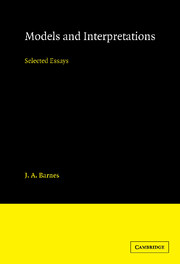Book contents
- Frontmatter
- Contents
- Preface
- Acknowledgments
- Introduction: social science in practice
- I MODELS OF THE REAL SOCIAL WORLD
- II MODELS OF SOCIAL SCIENCE
- 8 Feedback and real time in social inquiry (1967b)
- 9 Time flies like an arrow (1971f)
- 10 Kinship studies: some impressions of the current state of play (1980c)
- 11 Sociology in Cambridge: an inaugural lecture (1970m)
- 12 Social science in India: colonial import, indigenous product or universal truth? (1982c)
- III A MODEL OF MODELLING
- Postscript: structural amnesia (1947: 52–3)
- Bibliography
- Index
12 - Social science in India: colonial import, indigenous product or universal truth? (1982c)
Published online by Cambridge University Press: 08 January 2010
- Frontmatter
- Contents
- Preface
- Acknowledgments
- Introduction: social science in practice
- I MODELS OF THE REAL SOCIAL WORLD
- II MODELS OF SOCIAL SCIENCE
- 8 Feedback and real time in social inquiry (1967b)
- 9 Time flies like an arrow (1971f)
- 10 Kinship studies: some impressions of the current state of play (1980c)
- 11 Sociology in Cambridge: an inaugural lecture (1970m)
- 12 Social science in India: colonial import, indigenous product or universal truth? (1982c)
- III A MODEL OF MODELLING
- Postscript: structural amnesia (1947: 52–3)
- Bibliography
- Index
Summary
In this chapter I return to a topic discussed in Chapters 6 and 7, the colonial system that prevailed throughout much of the world until the middle of the twentieth century. This time, however, I look not at relations of power or perceptions of the past but at perceptions of social science. I had worked briefly in India before being invited to contribute to an international symposium on the differences in the praxis of anthropology between Western and non-Western countries. Its long history of intellectual endeavour made India well suited for an attempt to place social science in a context of imperial conquest and retreat. In the paper I endeavour to show that the view practitioners and onlookers take of the social science enterprise is conditioned by their political stance as well as, in some cases, by the writings of philosophers of science.
Introduction
In the past, almost all the empirical studies carried out under the banner of social anthropology were conducted by men and women who were citizens of industrial nations and whose focus of inquiry was the social life of communities with techniques simpler than their own. Even today, most anthropological fieldwork is of this kind. The phenomenon of indigenous anthropology in non-Western countries, and particularly in countries of the Third World, therefore poses two obvious questions. First, how, if at all, is the process of inquiry altered when anthropologists and other social scientists study people who are more like themselves or who at least belong to the same nation as themselves? And second, does the process change which therefore provides the financial, logistic and professional infrastructure for his inquiry, is poor and newly independent rather than affluent and with a long history of political and intellectual autonomy?
- Type
- Chapter
- Information
- Models and InterpretationsSelected Essays, pp. 196 - 212Publisher: Cambridge University PressPrint publication year: 1990



